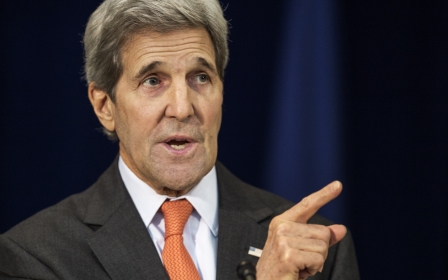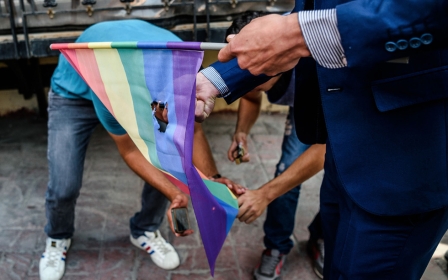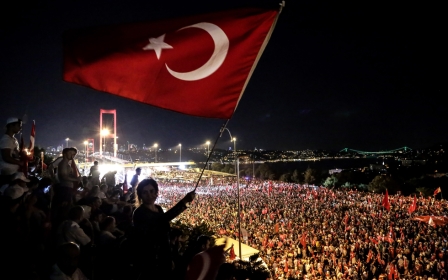Germany's Turkish community bitterly divided over Erdogan

COLOGNE, Germany - A stream of red flags flowed towards the river Rhine, overshadowed by the sight of the towering Cologne Dom Cathedral.
On 31 July, between 30,000 and 40,000 supporters of Turkish President Recep Tayyip Erdogan came together in Cologne to express solidarity with the man they considered - and as many placards read - “the hero of democracy”.
Even though the protest received little support from Cologne’s Turkish residents, the Union of European Turkish Democrats (UETD) – a pro-Erdogan lobby group - transported in Erdogan supporters from all over Germany and as far as Belgium and the UK.
A member of the UETD who took part in organising the demonstration said on the condition of anonymity: “We organised a few hundred buses from all over Europe, even from England.”
Turkish immigrants number around 1.5 million in Germany, constituting the largest minority group in the country, and they feel bitterly divided about Erdogan.
‘Erdogan is a dictator’
Upon hearing of the proposed pro-Erdogan demonstration a day before, a Turkish migrant spat on the floor and muttered “Bastards”.
Ali, a man in his early 40s who has lived most of his life in Germany, sipping a coffee in Cafe Istanbul, said: "Erdogan is a dictator, simple."
Even though he and other Turkish immigrants talk freely about politics among themselves, it can be dangerous when visiting Turkey, where even a misplaced Twitter post can land you in prison.
“Erdogan is the leader of terrorists," said one of Ali’s friends. "He supports Daesh [referring to the Islamic State group]; he attacked the Kurds, the Alawites."
"Erdogan has already closed down over 100 media sources," said another man, as the rest nodded in silence. "Of course there are those who support Erdogan; you saw the mass demonstrations in Istanbul. And they are students, people with brains."
Ali added: "Who knows? Most of the support is within Turkey.”
However, the phenomenon of patriotism within the third generation of youths became more widespread during the 31 July protest.
A 16-year-old boy from the German city Ulm, who also identified himself as Ali, said during the demonstration: “Erdogan made Turkey better. I know, because I see it when I go back every year and drive through the country by car. You can see improvements in every town and village.”
His friends added that about “only 5 percent of our Turkish friends are against Erdogan".
Organised rallies
However, according to a UETD member, who was speaking on condition of anonymity, UETD Youth has only “1,000 thousand or so members across the whole Europe”.
Nearby, a young man getting off a chartered bus from Stuttgart told MEE that the journey to the protest was helped by the Turkish-Islamic Union for Religious Affairs (DITIB). He was immediately told by an elderly woman to be quiet.
DITIB is one of the leading organisations within the Turkish and Muslim communities in Germany. Established in 1984, it now attracts “over 70 percent of Muslims living in Germany,” according to the official website.
Despite claims of being an “apolitical organisation” and “prohibiting any kind of party political activity,” DITIB allegedly took an active role in promoting the pro-Erdogan demonstration.
Cem Ozdemir, an MP and member of Germany’s Green Party, told reporters earlier this year that DITIB “is nothing other than the long-arm of the Turkish state". He added: “The Turkish government is making DITIB more of a front-organisation for AKP [Erdogan's ruling Justice and Development Party] in Germany.”
In a trendy area of Cologne, where gentrification has made its mark with craft coffee stores and student night bars, builders are putting finishing touches to DITIB’s biggest mosque. Inside, Cologne Muslims attend prayer services.
Dursun Atak, a DITIB member, told MEE: ”DITIB itself had nothing to do with the organisation of the protest.”
His colleague, who did want not to be named, said: “Imams come from Turkey, and the Turkish cultural and religious attaches have informed them about the protest.”
German media reported earlier this year that 970 imams trained in Turkey by the religious authorities there are preaching in Germany’s mosques.
“Of course, DITIB publicised the protest as an anti-coup, pro-democracy event, which is a universal principal. This doesn’t conflict with the apolitical stance,” Atak's colleague said.
Atak agreed: “These imams then chose to speak about the demonstration in mosques, but not necessarily in all of them. It can be that some groups within mosques then organised among themselves."
Gokay Sofuoglu, leader of the organisation Turkish Community in Germany (TGD), told MEE: “DITIB must ask itself the question: what kind of organisation is it? When it is in talks with the Turkish government, it loses its credibility as an open religious organisation."
“Imams come from Turkey, and they get paid from Turkey,” he added.
Protests aside, Tobias Kunstein, from the Research Institute of Political Science and European Questions at the University of Cologne, said that Germany is an ideal place for debate.
"I think that Turkish people from all political camps choose to live in Germany for a reason," Kunstein said. "Ultimately, this will supersede or at least conceal the current political cleavages, as it has in the past. One current example would be that last weekend’s demonstration in Cologne remained peaceful."
Gulen causes controversy
Challenging the pro-Erdogan stance among Turkish immigrants are the supporters of Fethullah Gulen - a former ally of Erdogan now living in the US and whose followers have become the primary target of the post-coup purge. Many, including Turkish immigrants in Germany, believe he is behind the failed coup, as claimed by Erdogan's government.
This week, DITIB opened an internal investigation against an imam who had praised an attack on a Gulen-aligned youth centre in North Rhine-Westphalia, the same region as Cologne. The imam was heard saying: “I was very pleased. May Allah reward you!”
On 31 July, at the mention of Gulen, a rumbling noise echoed throughout the crowd. “The Gulen movement had its own lawyers, its own people in the police, everywhere,” said Semih Turan, a protester in his early 20s, who came from Aachen. “But now they have shot themselves in the foot.”
He added: “We are here for democracy. Of course some protesters don't understand that - they think they’re here for Erdogan, but anyway, it stems from the same thing.”
Turkish Foreign Minister Mevlut Cavusoglu told CNN Turk on 28 July: "The Berlin government should extradite" Gulen supporters. Yet Gulen-aligned institutions, such as the Dialogue School Centre in Cologne, remain operating in Europe and elsewhere.
Fearing similar attacks as seen in Brussels, and more recently in Hassel, Turkish neighbours keep a close watch on the school even during holidays.
“All neighbours keep watch,” said a man in his 50s. “There have been no problems, but we must stay vigilant. I’ll call the police, they’re also around the corner.”
Gokay Sofuoglu, a leader of the TGD community organisation, told MEE: “We have seen two groupings along religious lines. On one side, the Gulen movement, and AKP on the other.
“AKP is attempting to transfer internal Turkish politics to Germany, and therefore the people are becoming increasingly polarised - [the] UETD is a long-arm of AKP in Europe.
“Bridges between people will become more and more important. I think this situation is a good opportunity for discussion within the Turkish community,” said Sofuoglu. Turkish history is seeing "a completely new chapter,” he added.
New MEE newsletter: Jerusalem Dispatch
Sign up to get the latest insights and analysis on Israel-Palestine, alongside Turkey Unpacked and other MEE newsletters
Middle East Eye delivers independent and unrivalled coverage and analysis of the Middle East, North Africa and beyond. To learn more about republishing this content and the associated fees, please fill out this form. More about MEE can be found here.




